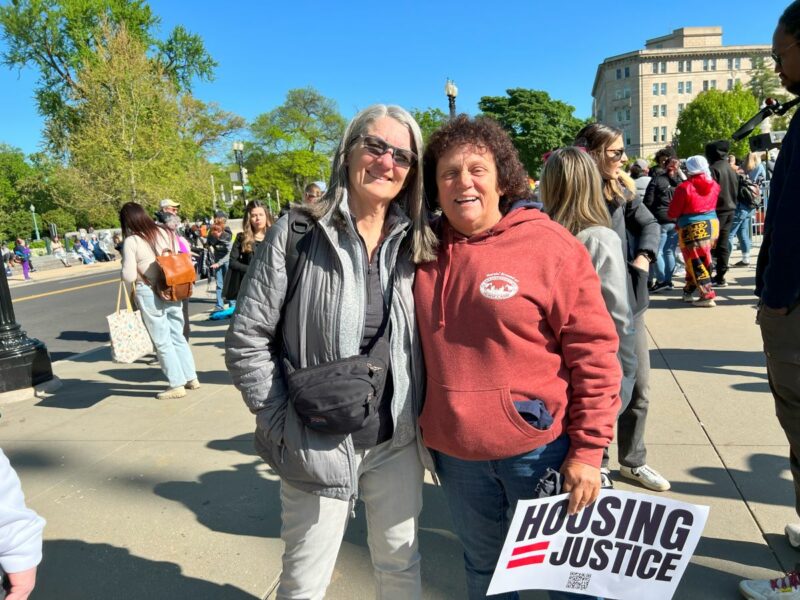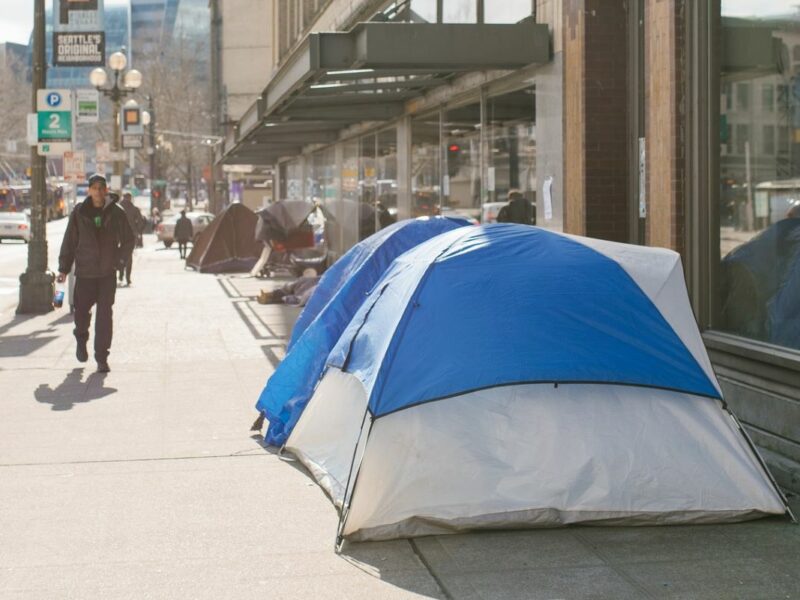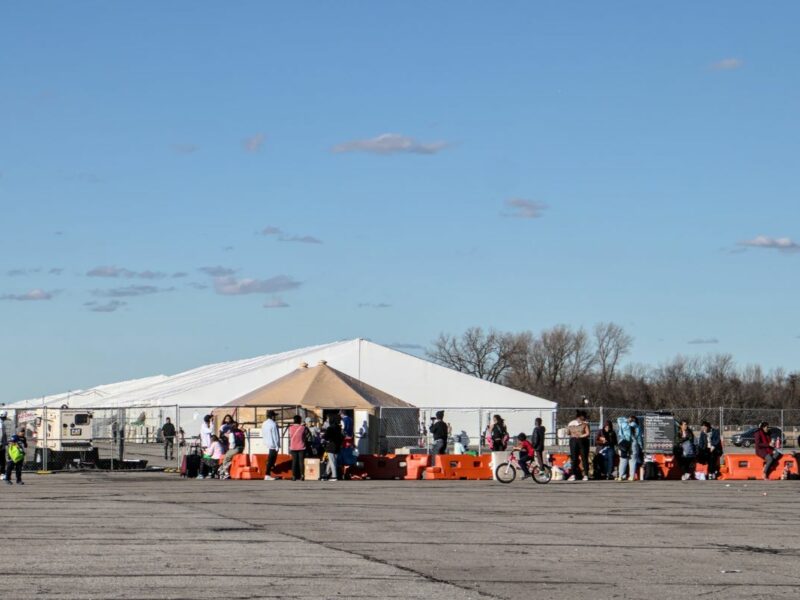One word to describe Eryn Leigh would be resilient.
The activist, mother, and community organizer wear their scars from the battlefields of homelessness with courage. As the advocate and academic recount their story of homelessness, one can only feel moved by their humility. Recycling trauma and transforming it into conviction, Eryn is nothing if not hopeful.
“My very first experience of being unhoused began upon leaving a hospital in Oshawa, Ontario,” Eryn said. “I had been living in rural towns in the Durham Region most of my life. In my teen years, I found myself spending a lot of time in the local hospital for chronic health issues.”
“The hospital staff were discharging me, and for a number of reasons, I wasn’t able to return to my childhood home,” Eryn continued. “They gave me the number for a youth shelter in Toronto, describing it as ‘a place to live’, and told me to call and see if I could go there.”
Still dumbfounded by the experience, Eryn recalls this experience as eye-opening.
“It’s hard to think about how uninformed I was at the time. I was a rural kid bouncing around in the medical system. I remember being thrilled that the person answering the phone responded with a ‘yes’ without questioning me. It felt like a miracle,” Eryn said. “I’d been struggling so hard until then to convince relatives and friends’ parents to let me stay with them. I’d not yet recognized that I was on my way to entering core homelessness in a huge, broken system of unhoused youth. A system that would continually spit me out and take me back in for years to come.”
Eryn recalls feeling immediately overwhelmed.
“The hospital sent me to Toronto on a bus. When I arrived, I didn’t know the shelter’s address. I offered a cab driver my last $20 to drive me there. The shelter was only around the corner from where I had hailed the cab, but he drove me around in circles until the $20 was up on the meter. This was my first taste of big city Toronto.”
Eryn explains that from there, experiences began to jumble together. Shuffling from one shelter to another, all they remember are mere fragments of fear and confusion from growing up in a fractured system of temporary homes and portable beds.
Eryn describes their first experience as a renter in Canada’s largest city.
“My first landlord was predatory and rented an illegal room to me in a run-down triplex for the entirety of my social assistance cheque,” Eryn said, adding their first roommates were other kids from neighborhood shelters. “We were all desperate to escape that world. And we clung to each other in some unhealthy ways.”
“I had a romantic relationship with one of those kids, and we shared a room so we could afford to do laundry and buy groceries for the six of us that lived in that triplex,” Eryn recalled, adding that while there were a lot of good memories of that first ‘home,’ they remember being very afraid of their landlord.
As time marched forward, keeping in contact with the many faces they shared those moments with became harder.
“I’m no longer in contact with most of the other kids,” Eryn said. “Some of them have passed away. Others continue to struggle with substance use and other impacts of their early traumas. It made it hard to maintain those relationships over the decades since then.”
When asked about how their family responded to their homelessness and precarious housing experiences, Eryn divulged a painful truth that compassion was often in short supply.
“My family and friends from my rural roots felt a lot of anger and betrayal when I became unhoused,” they admitted. “Some of the things they said to me at the time still haunt me, like how they didn’t want to keep in touch because they figured I’d end up dead because of my ‘shitty choices.'”
“My parents did not believe that I was being abused by an adult in my life at the time. They viewed my descent into homelessness as some kind of rebellion.”
“My siblings were also angry about it. My older sister once asked me why I was insisting on living in a doorway ‘like some kind of homeless person.’ My younger brother’s therapist encouraged him to write letters to me telling me how much I hurt the family and how angry he was about it.”
When asked how these experiences impacted them, Eryn didn’t shy away from the painful memories.
“On occasion, my parents still reference how painful it was for them that I ‘left them,’ and I try to gently challenge their perspectives when I am feeling strong enough. Often, I just avoid the topic. They were good parents, but the circumstances were so extreme that it isn’t easy for us to think back on and still maintain positive relations.”
As Eryn progressed into adulthood, they admitted that they would re-experience homelessness many more times over the years to come.
“I’m always waiting for the other shoe to drop,” Eryn said. “No matter how secure and safe my current life is, I’m never fully removed from that fear.”
“In my mid-thirties, I was living in a subsidized housing co-operative with the help of victim services after a violent experience. It felt terrifying to leave the safety of that building, which had been my security for many years while I finished my undergraduate degree and while raising a child.”
“I bought a small vacant cottage in the Maritimes with a nest egg inheritance, and I have been using my housing budget ever since to renovate and restore the space.”
Speaking for the first time as a homeowner, Eryn is working toward a master’s degree while also working in the housing sector.
Their New Brunswick housing career is thriving. Working in front-line and research capacities, Eryn brings a compassionate lens to clients’ needs.
“You would think any level of predictability and security would mean that I don’t fear homelessness anymore, but it hasn’t taken the edge off even slightly,” Eryn said. “Daily, I still wrestle with how close we all are to falling through those cracks.”
While this story might be a success story with a happy ending, Eryn is upfront about the mental toll their experiences have cost them.
“The experiences of being unhoused, and the adjacent experiences that went with it – self-medicating, unhealthy and dangerous relationships, treacherous living situations, years of unmet basic needs, etc. – left me with some heavy mental health burdens that have become lifelong for me. I live with complex PTSD and a dissociative disorder that greatly impacts my memory and emotional regulation,” Eryn said. “I work hard every day to navigate life with these conditions as a person, a parent, and a professional.”
“It isn’t impossible. But it’s a lot harder now than before.”
Recounting the discrimination they faced in their previous life, Eryn confesses that the parameters of homeless living are built on tragedy.
“I have been denied jobs, housing, friendship, health care, and much more because of my experiences of homelessness. I was born with a health condition that required a lot of surgery and medication in my infancy, which left my adult teeth visibly damaged. I still find people making remarks to me regularly about my ‘meth mouth’ or some other connection between my dental health and my experiences of homelessness,” they explain. “It’s become so common that I seldom bother to correct this scrutiny anymore.”
“It doesn’t matter how my teeth got that way. They read to the world as an indicator of my ‘troubled life,’ and they probably would even if I’d never had those experiences.”
“I’ll never stop feeling survivor’s guilt for the place I find myself today. But I will admit that retrofitting this abandoned cottage hasn’t been easy. I work, sweat, and struggle to keep this housing secure every day.”
“Growth and honesty are probably the most important ingredients in my path toward stability, which is ongoing and will be a lifetime journey for me.”
Eryn and their partner are expecting a child this October. And it is the goal of people like Eryn that future generations might live in a more compassionate world.
Currently preparing to speak at an upcoming rural advisory board meeting about ways that homelessness forced them out of their small town as a young person, Eryn hopes to help shape future policies. Their goal is to keep youth in their home communities when their lives are in transition.
And Eryn is far from finished their journey.
“I’m hoping to find reclaimed power, peace, and an avenue for more impactful advocacy through speaking. Those goals make it worthwhile to push myself out of my comfort zone,” Eryn said. “I have dreams of completing a thesis project that would see an encampment provided with land in a community trust, materials for habitable structures, and the basics needed to enjoy a quality of life that any of us would be content with. “
“Beyond school, I’m building a small homestead around my little house and hope to one day have a self-sustaining property to leave my children. One that will see them housed and fed and happy no matter what happens in their lives. I can’t think of a greater gift to give to them.”











